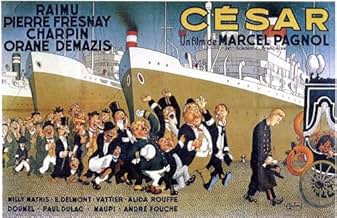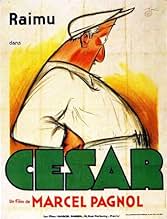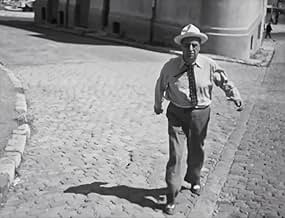Füge eine Handlung in deiner Sprache hinzuHonoré Panisse is dying, cheerfully, with friends, wife, and son at his side. He confesses to the priest in front of his friends; he insists that the doctor be truthful. But, he cannot bring... Alles lesenHonoré Panisse is dying, cheerfully, with friends, wife, and son at his side. He confesses to the priest in front of his friends; he insists that the doctor be truthful. But, he cannot bring himself to tell his son Cesariot that his real father is Marius, the absent son of César,... Alles lesenHonoré Panisse is dying, cheerfully, with friends, wife, and son at his side. He confesses to the priest in front of his friends; he insists that the doctor be truthful. But, he cannot bring himself to tell his son Cesariot that his real father is Marius, the absent son of César, Cesariot's godfather. Panisse leaves that to Fanny, the lad's mother. Dissembling that he... Alles lesen
- Honoré Panisse
- (as Charpin)
- Innocent Mangiapan
- (as Maupi)
- Le docteur Félicien Venelle
- (as Edouard Delmont)
- Pierre Dromard
- (as Bassac)
Empfohlene Bewertungen
The port is still (albeit much less so) a smuggler's paradise, and the social life of the city is still centred around good food, good love, and strong drink. Pagnol and Raimu knew the city well, and gave it the starring role in the trilogy. Imagine their joy at being able to relocate a stage play to the Mediterranean coast and use genuine atmospheric exteriors of the old port in all its pre-war glory. The city, and particularly the docks, took a real beating from both sides in WW2, so Pagnol not only created a few masterpieces of cinema, but also an invaluable document of a lost architecture and layout.
The nonsense between L'Academie and Pagnol was related to the prevailing Parisian view of southerners as being crude, unsophisticated people who lived a simple life of manual labour, procreation, drinking and eating (cul terreux). The view from the south that still prevails, is one of a Paris riddled with snobbish elites (peigne cul) totally divorced from the realities of healthy living . The wonderful climate and diet of the Mediterranean coast has long been a source of envy for those condemned by fate to dwell in the damp root vegetable fogs of northern France. Pagnol was gleefully rubbing their noses in it.
Pagnol opened up a lot of avenues in film, but the people of Marseilles remember him mostly for his authentic capturing of la vie quotidienne. I'll drink to that.
A sweet and fulfilling end to The First Ever and One of the Finest Trilogy of world Cinema. Cesar came after a gap of 4 years since Fanny and this was the only film in the Marseille Trilogy that was directed by writer Marcel Pagnol himself and wasn't adapted like earlier two films. One interesting thing i noticed about these 3 films is, these films are named after 3 characters but in the films the main focus is on other character. To elaborate a little, Marius (1931) was named after Marius but the film was more about Fanny's sacrifice. Next it was Fanny (1932) named after Fanny, but it was more about Cesar and Panisse and then came this film named after Cesar but it was more about Marius and his redemption. Cesar is about Fanny and Marius's son Césario who realises about his real father after the death of Panisse. The film is little longer unnecessarily where the first half doesn't really warm any things up. Then, the second half is all about emotional mess which makes couple of intelligent speeches on the family affairs. Like they said in the film, "Family Scene", actually the film ranks up there only. The character of Marius finally gets justice even though he doesn't clear the earlier mistake but the way he puts himself as a victim is nothing short of unexpected intellectual writing. Yes, the film could have been much better with sort of painful ending just like Marius had and that's why it became a Cult Classic, however, Cesar is a sweet send off to the trilogy with the mainstream idea of fulfilling the positive mindset of audience. Performance wise, Raimu outshines everyone despite less screen space, rest are fine. Pagnol's writing and direction both had minor faults but overall it was very good. In short, Cesar wraps up the trilogy nicely but with little more finesse it could have been a Classic.
RATING - 7/10*
By - #samthebestest
Still, there's enough room for musings on family, friendship and the sacrifices life demands. The cast is top-notch, with Raimu as brilliant as ever, while Fresnay delivers an electrifying speech towards the end.
Some may find the whole affair too slight, contrived and emotionally charged, but trust me, these three pics are definitely worth six hours of anyone's life... at least, anyone who loves good storytelling.
8 out of 10 hilarious deathbed confessions
While I loved MARIUS (1931) and Fanny (1932), I found myself falling asleep repeatedly while watching César. Again and again and again, I found myself dozing. At first, I thought I was just tired, but when I stopped the DVD each time I felt wide awake. I think in hindsight my reaction was because after the first few minutes of this movie, the trilogy, for me, was finished. In other words, the story was as complete as it should be and continuing it seemed superfluous. The 1961 Fanny film ended there, but continuing was probably, in hindsight, not the best decision. I honestly feel that the average viewer could see MARIUS and FANNY without having to see César. It just didn't seem necessary or compelling.
As far as performances and writing go, Raimu, who played Marius' father, was a marvelous actor and was excellent in all three movies. He was also fantastic in Pagnol's film La FEMME DU BOULANGER. An amazing talent. Also, Pagnol has written some amazing films apart from this series--try to see them all. It's just that of all of his work and the books I have read by him, my least favorite is César.
Wusstest du schon
- WissenswertesOdette Roger is credited in the opening credits as "la bonne de l'hotel" (the hotel maid) but does not appear in the film. The hotel sequence was cut out of the final print.
- Zitate
Honoré Panisse: One can't live without doing wrong.
- VerbindungenFeatured in Les sentiers Marcel Pagnol. Les chemins d'une vie (2005)
Top-Auswahl
Details
Box Office
- Bruttoertrag in den USA und Kanada
- 8.262 $
- Eröffnungswochenende in den USA und in Kanada
- 7.720 $
- 8. Jan. 2017
- Weltweiter Bruttoertrag
- 8.262 $
- Laufzeit
- 2 Std. 48 Min.(168 min)
- Farbe
- Sound-Mix
- Seitenverhältnis
- 1.37 : 1































